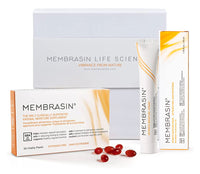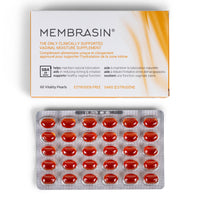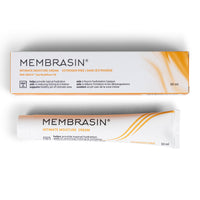Does Heredity Play a Role in Vaginal Dryness?
Though your mother may have never warned you about vaginal dryness, you might wonder if this menopausal symptom is hereditary. Since so many different factors can cause vaginal dryness, the answer is not cut and dried. However, some vaginal dryness causes may be hereditary, so check out the list below and talk to your mom or daughter about what runs in your genes.

Hereditary Causes of Vaginal Dryness
Some things that you inherited from your parents may cause vaginal dryness. Depression, for instance, has a genetic component, and scientists have posed that up to 40% of depression cases are hereditary. Though depression doesn’t cause vaginal dryness, many antidepressants do. About thirty percent of anxiety is inherited, too. Antidepressants are commonly prescribed for anxiety, as are sedatives, and both have the capacity to turn your vagina into the Sahara. Sjogren’s syndrome, a condition characterized by dry eyes and mouth, but that also can cause vaginal dryness, is also genetic.
Some serious illnesses are hereditary. Doctors have found that between five and ten percent of breast cancers are genetic. Ovarian, colon, and endometrial cancers can be inherited, too. Though the cancer itself may not cause vaginal dryness, many cancer treatments, including chemotherapy, hormonal therapy, and removal of the ovaries can cause vaginal dryness or early-onset menopause.
Causes of Vaginal Dryness That May Not Be Hereditary
Some causes of vaginal dryness have nothing to do with genetics. For instance, lifestyle factors such as pregnancy, birth, breastfeeding, smoking cigarettes, and douching contribute to vaginal dryness. If you are unsure why your vagina is suddenly dry, try reducing these habits if you can, and see if that eliminates the problem.

Conditions like diabetes aren’t clearly genetic, though diabetes does tend to run in families. And the side effects of diabetes can dry out your vagina as well.
It’s important to note that the number one cause of vaginal dryness is hormonal changes including diminished estrogen production—which every menopausal woman will experience. When you enter menopause, the chances are good that you will experience the effects of vaginal dryness when your estrogen production dies down. At what age you begin menopause is heavily influenced by heredity, but the symptoms you have during menopause are not always clearly linked to genetics. However, the age at which menopause begins is also influenced by how many kids a woman has and whether or not she has smoked.

Heredity Is Different From Inevitability
Even if your mother went through vaginal dryness during menopause, that doesn’t mean you have to accept it as your fate. Safe, hormone-free treatments are available that can help moisturize your vagina. SBA24® (the formula used exclusively in Membrasin® products) has been clinically studied and shown to nourish and support mucous membranes. Membrasin® Vitality Pearls are free of hormones, are plant-based, non-GMO, gluten free, soy free, and cruelty free. Try the Membrasin® 2-Step Starter Pack which also includes the topical Intimate Moisture Cream today!



